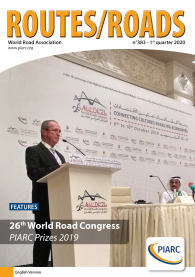Features
PIARC Prize "Road Maintenance and Operations" - Substitution of Asphalt with Expanded Polystyrene
Roads are fundamental elements for the economic and social development of any country; however, the carbon footprint generated by the construction of roads causes impacts on the environment and human health. Asphalt is a petroleum-based material, which is used as a binder in flexible pavement; however, certain consequences that this material causes (environmental degradation, depletion of oil reserves and a constant price increase) and low performance (problems like rutting, cracking, and other failures due to repeated traffic loads), led to the development of an alternative binder, which is resistant and respectful with the environment. This paper was aimed at exploring the potential benefits of recycled expanded polystyrene to be used as the main element of the mixture. Laboratory tests based on AASHTO and ASTM standards were performed to verify physical and mechanical properties. The results were compared with the asphalt AC-20 as a control sample to evaluate the viability of the new mixture. The result of this research shows that, in addition to replacing 100% of the asphalt, the compression and tension values improve, and the rutting resistance increases due to the susceptibility of the material to temperature changes. This material, in addition to solving structural problems that have been inherited by the use of bitumen, creates and introduces a clean manufacturing technology, which contributes in a certain way to minimize the use of natural resources, energy, and emissions. It has become a great alternative to the excessive consumption of expanded polystyrene anywhere in the world.



